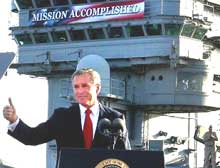
 Talk about victory
Talk about victory
Gregory Fossedal
September 9, 2004
Copyright © United Press
International
It was either Rick Barry or Tommy Lasorda who said of the professional sports playoffs, “it isn’t a series until each team has lost at home.” It may be the same in presidential politics – which is why, in the last two weeks, Kerry vs. Bush has become a series.
First, Senator Kerry lost on his chosen home court – service in Vietnam – courtesy of the swiftboat veterans. Kerry’s failure to respond substantively to their attacks – he instead focused on trying to pin responsibility for them on the Republican campaign, whining about the messenger rather than defending the truth – put him in danger. Then he failed to anticipate their far more effective attack on his post-service Senate testimony, regarding alleged atrocities by his fellow veterans. That made it a tactical rout.
President Bush helpfully stumbled on his own court – the war on terror – just a few days later, commenting that it might never be won.
Bush corrected himself more quickly and decisively than Mr. Kerry did, say, on his presence or lack thereof in Cambodia in December, 1968. And he may have staved off a rout partly through good fortune. A full week of hawkish speeches by the president and his supporters in New York reinforces in the notion that no one is more tough on terror than Mr. Bush, even if he thinks that toughness will not allow a relaxation for generations.
 Mission impossible? George Bush took a lot of flack for prematurely proclaiming the U.S. mission in Iraq had been accomplished. He should be criticized more, however, for musing that victory over terror may never be accomplished, a fundamentally un-American and, indeed, un-Bushian posture. |
What the GOP revealed at its convention speeches and body language, and in recent statements by Vice President Cheney amplifying the 30-years-war approach of the Bush Administration, is a great comfort with the war on terror. If the war on terror is not Mr. Bush’s spouse, it is certainly his party’s live-in mistress.
Republicans love to hold the war on terror, woo it and caress it. In New York, they emphasized (Tommy Franks, John McCain, Zell Miller) that it will go on for decades, if not generations. The tone was almost sacramental, like a bride and groom taking their vows.
The Patriot Act; the Homeland Security Department; the green and yellow and orange colors; retina scans; several rounds of CIA reform and re-reform; the commission to investigate whether the previous commission made mistakes in investigating mistakes made by intelligence reform commissions.... one gets the message that the GOP will not be unhappy if we are talking about these things in 2008, 2020, 2050....
Indeed, Thomas Ridge now calls for a national i.d. card. Perhaps, as an aide to Ronald Reagan once suggested during a discussion of immigration law, Americans should simply all be given a numerical tattoo on our wrists.
Of course, in literal terms, the no-end-in-sighters are right. The war on terror, in fact, is not a war, literally, in that it has not been declared (but ought to be), and as well, in practical terms, given it is true, there may never be a battleship surrender with broken sabers and fancy quill pens.
Does it follow, though, that there are no standards for judging that we have defeated our immediate enemy, Al Qaeda, and even its organized friends and allies, from Palestine to the Philippines? Will we still be on orange when the country lands a man on Mars?
Here, it seems to me, lies the opening for Mr. Kerry. It is fair game for him to pick on Mr. Bush’s formulation, since it is fairly revealing, not of any conscious thought by Mr. Bush, nor, however, of a mere tongue-twist infelicity; but rather of his administration's deepest instincts and latent inclinations on the never-ending war-non-war.
But the best debate, the best politics, doesn’t stop at pointing out an opponent’s error. Good politics teaches, and builds something. Mr. Kerry has an opportunity to show himself a serious-minded strategist and leader. The following recommendations are offered free of charge to Kerry, though they could as well be used by Mr. Bush, especially as they concern policy and substance.
1. Recognize Mr. Bush has good qualities – he does – manifested even in one of his most debatable decisions, the war on Iraq. It was launched with the best of intentions, if miscalculated. It liberated a country and offers hope to the whole Middle East. President Bush carried it out decisively and stuck with it even when some of the particulars turned out to be a “miscalculation.”
2. Then, explain how those very qualities, nevertheless, have had the unfortunate affect of harming not advancing the war on terror, specifically Al Qaeda. Former President Clinton did a good job of this at the Democratic convention, reminding voters that wisdom and toughness are not opposing values, and, indeed, are complementary.
3. Illustrate how one of your own supposedly bad qualities – one of seeing complexities and tending to balance issues along the middle – really amounts to something good: prudence. Prudence might have made for a better experience in Iraq, involving more allies, if not as fast, and leaving more resources in Afghanistan and Pakistan – as well as leaving them available to keep the heat on Iran and North Korea.
That other quality, deference to allies – which Vice President Cheney mocks as a “sensitivity” not worthy of America’s great warriors – is another opening for Kerry to commit what Jeff Greenfield aptly calls “political jujitsu.” For the opposite is true. Abraham Lincon carefully calibrated his war aims to avoid alienating Kentucky, Missouri, Maryland, and other border states. Later, when the time was right, he ratcheted up the slavery component of the war, exciting popular support in England and France.
Likewise, Eisenhower juggled carefully between Britain and France, not to mention a truly evil ally, the Soviet Union, that America felt compelled to work with. Put Dick Cheney in Ike’s place circa 1942-43, and there might never have been a Normandy invasion. Or America might have landed almost alone.
 Could someone hand me a history book? Vice President Dick Cheney's comments about Lincoln, Eisenhower, and other great war leaders seem to lack an appreciation for the political skill in dealing with allied concerns -- one might even say sensitivity -- that were at the heart of their military triumphs. Woodrow Wilson, a brilliant idealist but one less attuned to U.S. and European political forces, won the war but lost the peace. |
In fact, this actually happened. Mr. Cheney impolitely demurred at taking just such an approach when a group of distinguished Republicans and Democrats begged the administration to adopt a true Middle East Marshall Plan from February to July of 2003.
Mr. Kerry should even recognize that Mr. Bush’s coalition, involving Britain, Spain, Austrialia, Italy, and dozens of countries, has impressive elements. That achievement, though, must be balanced against the loss and alienation of support around the world, and of unity at home.
In the war on terror – the more so if this is to be a decades-long struggle, though it ought not to be – every American citizen, every man and woman who wishes us well in the world, is a soldier. In that sense, on balance, Mr. Bush has divided his own troops. This is a critical failure, albeit a well-meaning one.
Which candidate can most credibly claim he will win the war on terror? In my opinion, it will be the one who actually envisions winning it; talks about it; describes what the stages will look like and how our strategy will adapt as we meet those stages. And then sets measurable standards – the kind Mr. Bush and Mr. Kerry rightly want to apply to school children, big corporations, and nearly everyone else in society – for meeting it in the next four years, or less.
How will we get Osama Bin Laden? Are we willing to enter Iran or Pakistan if, after a suitable ultimatum, they are unable to produce him?
Mr. Bush should explain how he will bring Bin Laden to justice after three years of failure to do so. Mr. Kerry should promise to jail him and execute him, after giving him a fair trial of course.
When will the war on terror be won? A good standard might be, define it in terms of organized terror, as in the groups identified regularly by the State Department. Once these groups have been eliminated, a partial return to normalcy may take place. Previous wars, from 1865 to 1945, not to mention 2003, were "over" before every last combatant had surrendered.
As a standard of progress, one might define victory it in terms of terrorist incidents. As these go down, we will be on the way to Richmond and the fall of the wall. Perhaps we won’t have “won,” in the sense that a war on crime has never eliminated every thief. But we can, at that point, contemplate appropriate adjustments in our alliances, and our approaches. We should, at such a point, revise and recalibrate our intelligence strategy and troop deployments, just as we should have done in the 1990s following the collapse of the Soviet Empire and the rise of Al Qaeda.
(Note that the Bush Administration initially estimated a significant reduction in terrorism in 2003. When the math was done correctly, it turned out terrorist incidents went up, and they appear to be rising in 2004. If progress continues in this direction, the war on terror indeed will be going on forever. But it should be the goal of Kerry and Bush alike to start winning and, yes, achieve victory.)
Will our great-grandchildren live under the Patriot Act as it is presently written? If not, when can it be relaxed and eliminated?
Both candidates seem to fear talking about such matters. Perhaps they feel that victory is not plausible, or will be mis-characterized by their opponents.
It was at just such a moment, of course, in 1982 – before the British Parliament – that Ronald Reagan dared to begin speaking about the defeat of communism and the emerging global triumph of democracy. Nearly all Democrats, and – least we forget: such conservatives as Jeanne Kirkpatrick, George Will, Fareed Zakaria, Henry Kissinger, and David Frum – declared the goal and the strategy implausible, if not downright dangerous. The American people declared it doable and winnable – and then executed it.
At a like time, well before victory was in sight, these leaders began to contemplate a post-war order for the disposition of former slaves. At a like time, Franklin Roosevelt, and George H.W. Bush, were already not only talking about, but working on, the new post-war world order.
In this sense, Mr. Bush’s remarks about winnability are an opportunity for him. The gap, given his admiration for Ronald Reagan and the obvious parallels, may even be smaller. On the other hand, Mr. Kerry has more need to demonstrate his fona fides. Either candidate, of course, is welcome to adopt this strategy.
The result might be that too-rare and most-beneficial of developments in a presidential campaign – a serious, substantive debate.
Gregory Fossedal is a senior fellow at the Alexis de Tocqueville Institution and the author of "Direct Democracy in Switzerland" and "The Democratic Imperative." His opinions are entirely his own and not necessarily those of UPI or AdTI.